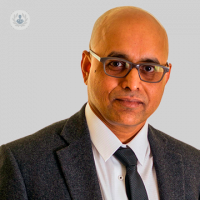Degenerative spinal disease: causes, symptoms and treatment
Written by:Top Doctors recently had the chance to interview extremely well-regarded and experienced neurosurgeon and spinal surgeon, Mr Venkat Iyer. Here, we quizzed him on what exactly degenerative spinal disease is, what causes it, and how it is treated most effectively.

What exactly is degenerative spinal disease?
It is when the joints of each vertebrae start to get thicker, and in doing so, begin trapping the nerves of the spinal cord.
What are the main symptoms?
It depends on whether degenerative spinal disease occurs in the neck or the back. The most common symptom, though, is lower back pain. Sciatica, arm pain, difficulty walking, and difficulty moving the arm are all other common symptoms.
What causes degenerative spinal disease?
We are currently unsure as to what exactly causes it. It is certainly partly age-related and partly related to the activity that you do in your life. Being extremely overweight as well as smoking can influence one’s chances of suffering from degenerative spinal disease.
How is it diagnosed?
The overall diagnosis depends on the symptoms. The most common form of diagnosis is an MRI scan of the spine. A CT scan is occasionally required.
What are the different treatment options available?
There are many different ways to treat degenerative spinal disease. The main ones include the following:
- painkillers
- physiotherapy
- lifestyle changes
- injections around the nerves
- injections around the spinal canal
- surgery (to relieve compression)
Book an appointment with Mr Venkat Iyer today via his Top Doctors profile. The highly esteemed Bath and Bristol-based neurosurgeon and spinal surgeon can help you when it comes to relieving back and/or neck pain.


